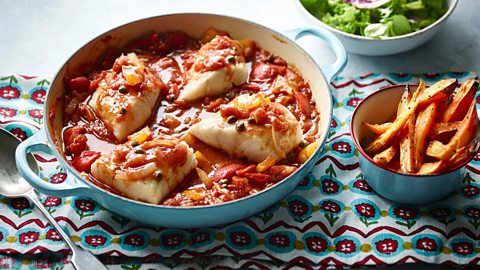What are the best and worst foods for heartburn?
Indigestion symptoms can be painful and cause sleepless nights, but changing your diet could make a differenceâ¦

According to the most of us will suffer with indigestion and its many symptoms at some point in our lives.
Heartburn, which usually presents as a burning sensation in the chest, is one of the main symptoms of indigestion and is caused by acid reflux.
Dr Philip Woodland, consultant gastroenterologist, Royal London Hospital and lecturer atQueen Mary University of London, explains: âAcid reflux is when stomach juices, which are acidic, move upwards from the stomach into the oesophagus (food pipe/gullet), which does not usually contain acid material.â
âHeartburn is perhaps the most common symptom of acid reflux, felt as a burning sensation behind the breastbone.â
Related stories
What foods cause heartburn?
âThe most common food and drink triggers are large meals as these increase pressure in the stomach,â explains Woodland.
âMeals high in fat may be worse at promoting reflux. Alcohol (particularly white wine) can cause the valve muscle to relax more and increase acid reflux. In some people caffeine and chocolate can also be triggers.
âSome people find spicy foods worsen symptoms. Interestingly, they donât necessarily make acid reflux worse, but the capsaicin in spicy foods triggers the same nerve receptors as acid does.â
If youâre making a curry you could opt for one without chillies and a mild curry powder, like this easy chicken curry recipe by Shelina Permalloo
Dr James Kennedy is a gastroenterology registrar and academic research fellow at Royal Berkshire Hospital and University of Reading, he says that fizzy drinks are also a .
In terms of why some things cause digestive issues, âSome foods may simply lower the pH of the stomach contents, making it more acidic,â says Kennedy.
For other foods, such as chocolate, have shown that they may relax the muscles at the join between the oesophagus and the stomach, potentially allowing stomach contents to flow upwards more easily.
How to work out which foods are triggering your heartburn?
Eliminating different foods until you find the ones that are causing issues is the key, says Kennedy, though he warns: âAs with any elimination diet, it is important not to cut everything out at once.
âStop one thing at a time. If the symptoms go away when the food item is stopped and importantly return when it is re-introduced, it is likely to be a trigger.â
Can some foods improve heartburn?
âThere are no specific foods that make reflux better, unfortunately,â says Woodland.
Though he suggests, âavoiding large fatty meals, especially close to bedtime, when you lie flat. This will reduce the pressure difference between the stomach and oesophagus and can reduce reflux.
Both Woodland and Kennedy both state preventing heartburn through your diet is far more effective than trying to stop symptoms through it. âMuch of the internet is full of anecdotes with very little credibility behind them,â says Woodland.
âIn addition to reducing trigger foods, there are other side benefits of a healthy diet that can guard against reflux. For example, Mediterranean diets are often low in saturated fats, high in plant-based products and low in alcohol. These will often be associated with lower obesity levels. Obesity is a big risk factor for acid reflux. This is most often because there is an increased abdominal pressure which in turn promotes âpushingâ of acid up into the oesophagus,â says Woodland.
Kennedy adds: âMost of the focus on diet and reflux is about taking away, rather than adding in, but there is to suggest a âprudent' diet rich in fruit, vegetables, wholegrain, fish and poultry may reduce reflux disease symptoms when combined with other lifestyle factors, it is not clear why this might be.
âThe Mediterranean diet usually contains even more fruit, vegetables, legumes and less processed red meat than the prudent diet and has also been shown to have an association with ,â adds Kennedy.
Sicilian fish with sweet potato chips
The Mediterranean diet is linked to lower rates of heartburn and this great-tasting dish incorporates key elements of the diet

One common herbal digestive remedy may not be appropriate when it comes to heartburn, explains Kennedy, âPeppermint tea or peppermint oil is an interesting one â it has a very useful role in gastrointestinal symptoms such as abdominal cramps, bloating and flatulence because it acts to relax the smooth muscle in the walls of the intestine. This does however mean it will also relax those muscles at the gastro-oesophageal junction, in theory allowing more acid to pass upwards and worsening symptoms.â
Are some people more likely to have heartburn?
âAs with obesity, in pregnancy there is a lot more acid reflux. This is because of the increase in abdominal pressure. Thankfully, this gets better after the baby is delivered,â says Woodland.
âAcid reflux becomes a little more common as you get older, but it is not a dramatic impact. You can become more prone to developing a hiatus hernia over time and this definitely increases reflux. This is where a small portion of the stomach slips up through the diaphragm so it lies up in the chest. This dramatically reduces the barrier strength against reflux into the oesophagus.â
While common, Kennedy does warn that new symptoms should be taken seriously. âNew onset reflux symptoms over the age of 55 should not be ignored and should prompt a visit to the GP as they could be due to something more serious.â
Woodland explains though that âIn many people, occasional reflux symptoms are common and should not be a cause for alarm or widespread life changes. When it becomes more impactful on quality of life is when more action is required.
âMost importantly, try to reduce weight if overweight and stop smoking if you smoke. Otherwise, keep trigger foods/drink (especially alcohol) in moderation. Avoid large fatty meals, especially close to bedtime and try to keep 3-4 hours between the evening meal and going to bed if possible.â
Disclaimer: The above does not constitute medical advice, if you are concerned about symptoms speak to a medical professional. Kennedy explains: âAnyone with significant weight loss, or new onset upper gastrointestinal symptoms such as heartburn or acid reflux, having problems swallowing (dysphagia), feeling or being sick, symptoms of indigestion, such as burping a lot and feeling full very quickly when eating, should consult their GP to discuss their symptoms as in some cases these may be suggestive of a more concerning diagnosis.â
Originally published April 2024